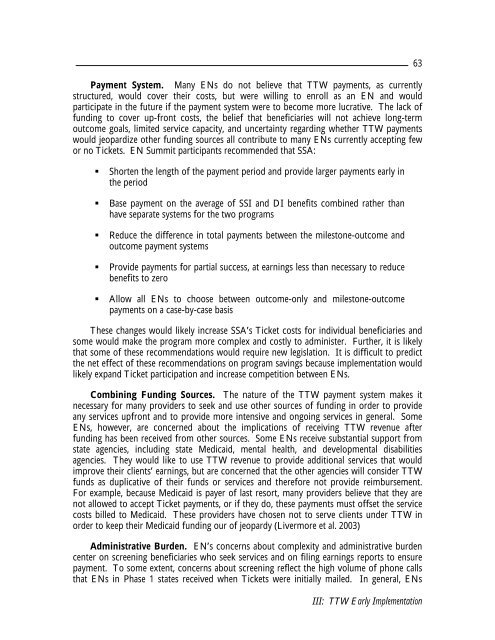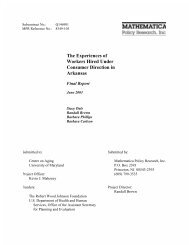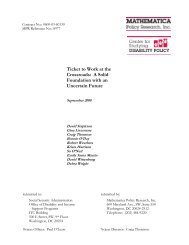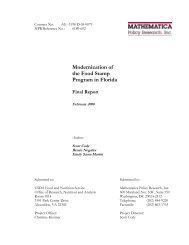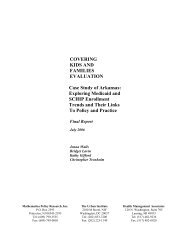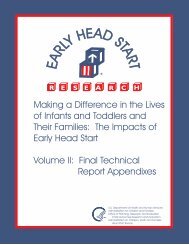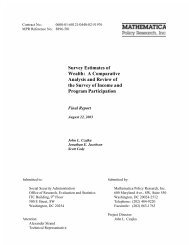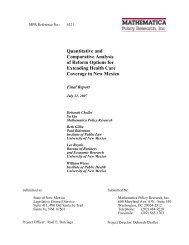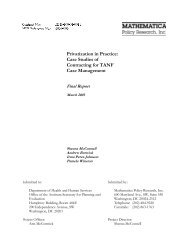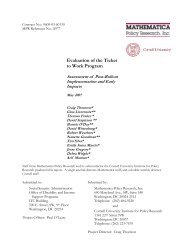Evaluation of the Ticket to Work Program Initial Evaluation Report
Evaluation of the Ticket to Work Program Initial Evaluation Report
Evaluation of the Ticket to Work Program Initial Evaluation Report
Create successful ePaper yourself
Turn your PDF publications into a flip-book with our unique Google optimized e-Paper software.
Payment System. Many ENs do not believe that TTW payments, as currently<br />
structured, would cover <strong>the</strong>ir costs, but were willing <strong>to</strong> enroll as an EN and would<br />
participate in <strong>the</strong> future if <strong>the</strong> payment system were <strong>to</strong> become more lucrative. The lack <strong>of</strong><br />
funding <strong>to</strong> cover up-front costs, <strong>the</strong> belief that beneficiaries will not achieve long-term<br />
outcome goals, limited service capacity, and uncertainty regarding whe<strong>the</strong>r TTW payments<br />
would jeopardize o<strong>the</strong>r funding sources all contribute <strong>to</strong> many ENs currently accepting few<br />
or no <strong>Ticket</strong>s. EN Summit participants recommended that SSA:<br />
! Shorten <strong>the</strong> length <strong>of</strong> <strong>the</strong> payment period and provide larger payments early in<br />
<strong>the</strong> period<br />
! Base payment on <strong>the</strong> average <strong>of</strong> SSI and DI benefits combined ra<strong>the</strong>r than<br />
have separate systems for <strong>the</strong> two programs<br />
! Reduce <strong>the</strong> difference in <strong>to</strong>tal payments between <strong>the</strong> miles<strong>to</strong>ne-outcome and<br />
outcome payment systems<br />
! Provide payments for partial success, at earnings less than necessary <strong>to</strong> reduce<br />
benefits <strong>to</strong> zero<br />
! Allow all ENs <strong>to</strong> choose between outcome-only and miles<strong>to</strong>ne-outcome<br />
payments on a case-by-case basis<br />
These changes would likely increase SSA’s <strong>Ticket</strong> costs for individual beneficiaries and<br />
some would make <strong>the</strong> program more complex and costly <strong>to</strong> administer. Fur<strong>the</strong>r, it is likely<br />
that some <strong>of</strong> <strong>the</strong>se recommendations would require new legislation. It is difficult <strong>to</strong> predict<br />
<strong>the</strong> net effect <strong>of</strong> <strong>the</strong>se recommendations on program savings because implementation would<br />
likely expand <strong>Ticket</strong> participation and increase competition between ENs.<br />
Combining Funding Sources. The nature <strong>of</strong> <strong>the</strong> TTW payment system makes it<br />
necessary for many providers <strong>to</strong> seek and use o<strong>the</strong>r sources <strong>of</strong> funding in order <strong>to</strong> provide<br />
any services upfront and <strong>to</strong> provide more intensive and ongoing services in general. Some<br />
ENs, however, are concerned about <strong>the</strong> implications <strong>of</strong> receiving TTW revenue after<br />
funding has been received from o<strong>the</strong>r sources. Some ENs receive substantial support from<br />
state agencies, including state Medicaid, mental health, and developmental disabilities<br />
agencies. They would like <strong>to</strong> use TTW revenue <strong>to</strong> provide additional services that would<br />
improve <strong>the</strong>ir clients’ earnings, but are concerned that <strong>the</strong> o<strong>the</strong>r agencies will consider TTW<br />
funds as duplicative <strong>of</strong> <strong>the</strong>ir funds or services and <strong>the</strong>refore not provide reimbursement.<br />
For example, because Medicaid is payer <strong>of</strong> last resort, many providers believe that <strong>the</strong>y are<br />
not allowed <strong>to</strong> accept <strong>Ticket</strong> payments, or if <strong>the</strong>y do, <strong>the</strong>se payments must <strong>of</strong>fset <strong>the</strong> service<br />
costs billed <strong>to</strong> Medicaid. These providers have chosen not <strong>to</strong> serve clients under TTW in<br />
order <strong>to</strong> keep <strong>the</strong>ir Medicaid funding our <strong>of</strong> jeopardy (Livermore et al. 2003)<br />
Administrative Burden. EN’s concerns about complexity and administrative burden<br />
center on screening beneficiaries who seek services and on filing earnings reports <strong>to</strong> ensure<br />
payment. To some extent, concerns about screening reflect <strong>the</strong> high volume <strong>of</strong> phone calls<br />
that ENs in Phase 1 states received when <strong>Ticket</strong>s were initially mailed. In general, ENs<br />
63<br />
III: TTW Early Implementation


